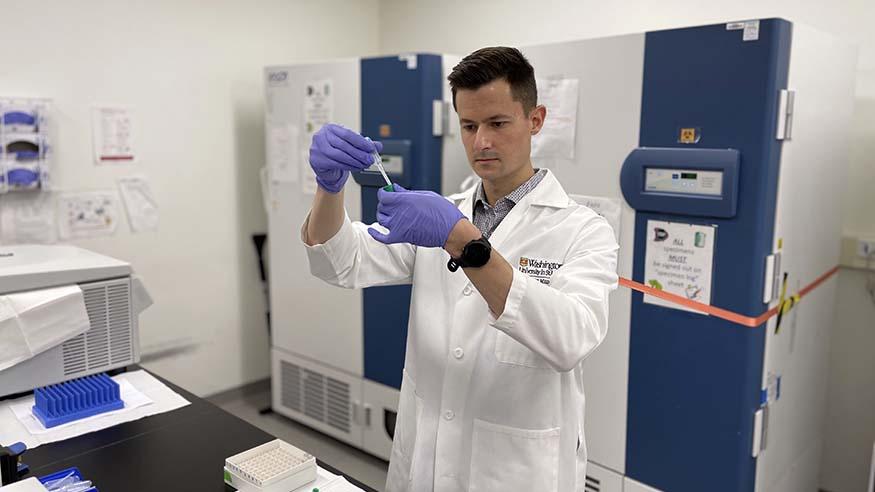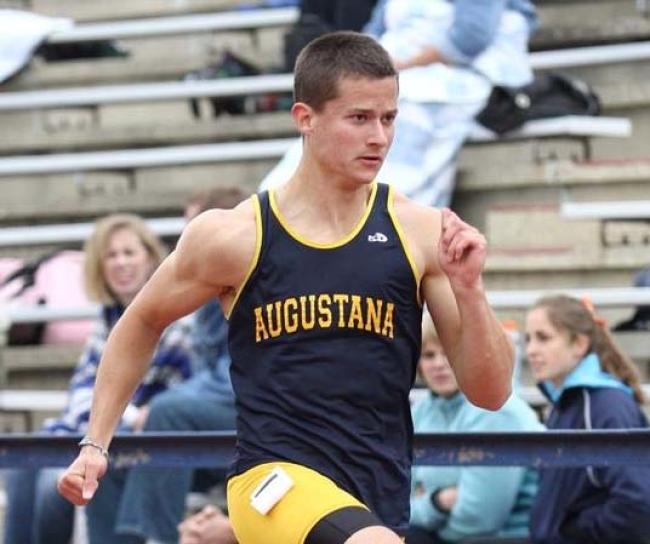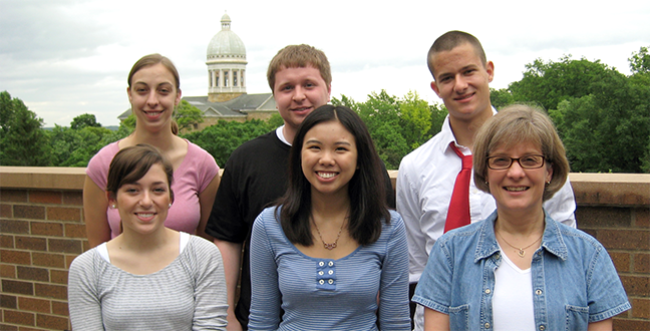
How transformation happens in four years at Augustana
Some college students have a rule about professor tardiness: allow a professor with a master’s degree 10 minutes to arrive late. If the prof has a Ph.D., give them 15 minutes.
Max Petersen ’10, an endocrinology fellow with M.D. and Ph.D. degrees from Yale, would say Augustana professors have too much respect for their students to keep them waiting like that.
“I never got the sense that the faculty at Augustana treated me as anything other than a future colleague, someone worthy of respect and mentorship,” he said.
“I grew more in those four years than in any other four-year period of my life.”
Now Petersen is a fellow in the Oliver Langenberg Physician-Scientist Training Program at Washington University School of Medicine in St. Louis. His goal is to “bridge the gap between clinical research and the practice of medicine, by doing research into human metabolism and metabolic disease while also seeing patients with those conditions.”
It’s the second physician-scientist training program for Petersen. The first was during his internal medicine residency at Massachusetts General in Boston in 2018-20. Such programs are ideal for science-oriented physicians like him, drawn to the connection between why and how.
An exceptional path
Augustana College is excellent preparation for undergraduates who, like Petersen, appreciate deep investigation and broad exploration, and connecting what they learn. Though Petersen’s path has been exceptional in many ways, he’s not alone in discovering how much one can accomplish at Augustana, and then beyond.

For him, it meant balancing success in academics, athletics and the arts — plus trying new things, falling in love, and developing life-changing relationships with friends and mentors.
Coming to Augustana, Petersen was a self-described “mediocre sprinter” who also liked to play the piano and thought he might do something with chemistry. Health and medicine were not even on his radar. Faculty and peer mentors helped him find his way.
What he valued most in his faculty mentors was that they met him where he was, “a 19-year-old who didn’t know a whole lot,” but thought he did. “They were always willing to … seem unhurried … to talk about whatever it was I wanted to talk about, and interject with their career experience and life experience when they had something to offer. Which was almost always.”
One of his mentors was Dr. Pamela Trotter, Robert W. Beart Professor of Chemistry and Biochemistry at Augustana. Having gone through a similar decision-making process in college, she often took the time to share her experience with him.

“As someone who didn’t have doctors or scientists in the family, hearing the lived experience of someone who had been down those paths was totally invaluable,” he said.
Dr. Trotter often works with students in her research lab. She sees professor-student collaboration as one of her primary roles, and something she missed when she was teaching in the large university setting at University of Texas at Austin, before coming to Augustana.
Working with Petersen was rewarding, she said, because when she gave him a problem, “he just tackled it.” They even published a paper together in The Journal of Young Investigators, with Petersen as the primary author.
“It’s been kind of fun to see his path, because he worked on metabolism in my lab and he’s still working on metabolism. So, we talk the same language — but he has the added benefit in that he gets to actually see it in human beings, which is really cool.”
Transformation
By the time he graduated from Augustana, Petersen was a double major in biochemistry/pre-medicine and religion. He also had become an Academic All-American sprinter, a pianist in the jazz ensemble and combos, a volunteer at a pediatric clinic in Guatemala, a summer research intern at the Texas Medical Center, and winner of the prestigious Glenn T. Seaborg Science Award in 2010.
Even then he wasn’t alone. His good friend Zak Rajput ’09 won the Seaborg Award just the previous year. After Augustana, Petersen and Rajput both spent time at Massachusetts General Hospital, and now they see each other often at Washington University, where Rajput is an instructor and radiologist.
Petersen and his wife Danielle Oester ’09 Petersen have two sons, Everett (5) and Brooks (2). His sister Emily Petersen ’12 is a home hospice nurse in Chicago.
Recently, Petersen said, he realized he had been in medical training for 13 years — the same length of time as kindergarten through 12th grade. And his time at Augustana, the years between? He compares it to the Cambrian explosion, the transformative historical period of rapidly expanding biodiversity.
“I grew more in those four years than in any other four-year period of my life. And it was because of the incredible breadth of opportunities that were available to me, and the mentors who were willing to sit with me, and reflect with me, and take me under their wing.”
He thinks everyone starting college hopes their experience will be transformative, but adds that there’s an active component: one has to try new things, take opportunities and live life to the fullest.
That’s what Max Petersen did. And Augustana supported him every step of the way.
